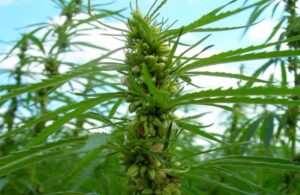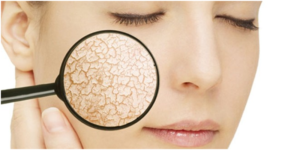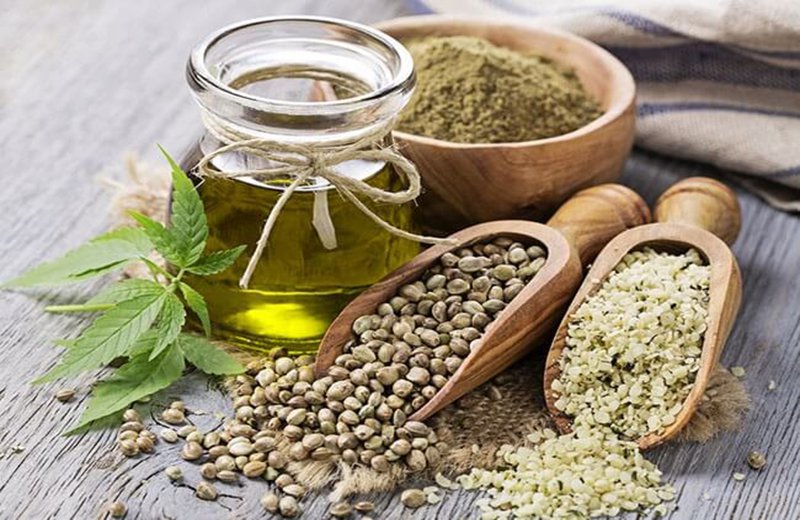The scientific name of the hemp plant is Cannabis sativa, the same species as marijuana but with many distinguishing features. Hemp seeds contain only a very small amount of THC, the psychoactive compound found in cannabis. Hemp seeds are particularly nutritious and rich in unsaturated fats, protein, and minerals. Below are 6 researched health benefits of hemp seeds.
1. Hemp seeds are very nutrient-dense
Hemp seeds are highly nutritious, with a mild and appealing flavor. Hemp seeds contain over 30% fat, particularly rich in two essential fatty acids: linoleic acid (omega-6) and alpha-linolenic acid (omega-3). They also contain gamma-linolenic acid, a compound beneficial for health.
Hemp seeds are also an excellent source of protein, as 25% of their total calories come from high-quality protein. This protein content is significantly higher than that of similar foods like chia seeds and flaxseeds, with calories from 16% to 18% protein.
The levels of vitamin E and minerals such as phosphorus, potassium, sodium, magnesium, sulfur, calcium, iron, and zinc in hemp seeds are also very high.
Hemp seeds can be consumed raw, cooked, or roasted. Hemp seed oil is also very healthy and has been used as food and medicine in China for over 3,000 years.

2. Hemp seeds may reduce the risk of cardiovascular diseases
Using hemp seeds may reduce the risk of cardiovascular disease. Inside hemp seeds contains a large amount of the amino acid arginine, which is a source of nitric oxide in the body. Nitric oxide is a gas molecule that helps dilate blood vessels, lowering blood pressure and reducing the risk of cardiovascular disease.
In a large study of 13,000 people, increased levels of arginine corresponded with decreased levels of C-reactive protein (CRP), which is a marker of inflammation. High CRP levels are associated with cardiovascular issues.
Hemp seeds also contain gamma-linolenic acid, which helps reduce the body’s inflammatory processes, lowering the risk of diseases such as heart and vascular conditions.
Additionally, animal studies have shown that hemp seeds or hemp seed oil may lower blood pressure, reduce the risk of thrombosis, and enhance recovery after a heart attack.
3. Hemp seeds and hemp seed oil may benefit skin conditions
Fatty acids can affect immune responses in your body. Studies show that the immune system relies on the balance of omega-6 and omega-3 fatty acids.
Hemp seeds are a source of essential unsaturated fatty acids. They have a ratio of omega-6 to omega-3 of 3:1, which is considered optimal. Studies indicate that providing hemp seed oil to individuals with eczema may improve levels of essential fatty acids in the blood. The oil may also reduce dry skin, improve itching, and decrease the need for skin medication.

4. Hemp seeds are a good source of plant protein for the body.
About 25% of the calories in hemp seeds come from protein, which is a relatively high amount. In fact, by weight, hemp seeds provide a protein content similar to that of beef and lamb. 30 grams of hemp seeds is equivalent to about 2 tablespoons, providing approximately 11 grams of protein.
They are considered a pure protein source, meaning that the protein from hemp seeds can provide all essential amino acids. The body cannot produce these essential amino acids and must obtain them from the daily diet. This pure protein source is very rare among plant foods, as most plants tend to lack the amino acid lysine.
Quinoa is another example of a completely plant-based protein source. Hemp seeds contain a significant amount of the amino acids methionine and cysteine, as well as very high levels of arginine and glutamic acid. The digestibility of protein from hemp is also very good – better than protein sourced from grains, nuts, and legumes.
5. Hemp seeds may reduce symptoms of PMS (premenstrual syndrome) and menopause.
Up to 80% of women of reproductive age may experience physical or emotional symptoms due to Premenstrual Syndrome (PMS). These symptoms may be caused by increased sensitivity to the hormone prolactin.
Gamma-linolenic acid (GLA), found in hemp seeds, has the ability to produce prostaglandin E1, which reduces the effects of prolactin.
In a study of women with PMS, using 1 gram of essential fatty acids – containing 210 mg of GLA daily significantly reduced symptoms. Other studies on evening primrose oil, which is also rich in GLA, may be highly effective in reducing symptoms in women who have failed other PMS therapies. It alleviates breast tenderness, depression, discomfort, and swelling symptoms related to PMS.
Since hemp seeds are high in GLA, some studies have indicated that they may also help reduce menopausal symptoms. The mechanism is still unclear, but GLA in hemp seeds appears to regulate hormone imbalances and inflammation associated with menopause in women.
6. Raw hemp seeds may help improve digestion.
Fiber is an essential part of the diet and is beneficial for the digestive system. Raw hemp seeds contain soluble and insoluble fiber in a ratio of 20% to 80%.
Soluble fiber forms a gel-like layer in the intestines and serves as nutrition for beneficial digestive bacteria and can also reduce sudden spikes in blood sugar levels and regulate cholesterol levels.
Insoluble fiber helps soften and add bulk to stool, aiding the digestive system to function effectively. It is also associated with a reduced risk of diabetes.
However, hulled hemp seeds – also known as hemp seed hearts – contain very little fiber because the outer shell, which contains a lot of fiber, has been removed.
In summary, hemp seeds are very good for health because they are rich in unsaturated fats, high-quality protein, and some minerals. It should be noted that the outer shell of hemp seeds may contain a small amount of THC (<0.3%), a compound that stimulates the nervous system found in cannabis. Those who have been dependent on cannabis should not use these seeds.

